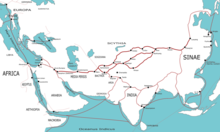Balch
|
بلخ Balch |
||
|---|---|---|
|
|
||
| Coordinates | 36 ° 45 ′ N , 66 ° 54 ′ E | |
| Basic data | ||
| Country | Afghanistan | |
| Balch | ||
| District | Balch | |
| ISO 3166-2 | AF-BAL | |
| Residents | 87,052 (calculation 2012) | |


Balkh ( Persian بلخ, DMG Balḫ ; English Balkh ; ancient Greek Baktra ; Old Iranian also Zariaspa "golden horse", Arabic tooأُمّ المَدَائِن, DMG Umm al-madāʾin 'mother of cities') is a city in the province of Balkh in the north of Afghanistan . Balkh is an important place of pilgrimage, around 20 kilometers from Mazar-e Sharif , the largest city in northern Afghanistan. The population is calculated to be 87,000 in 2012. The city has grown enormously since then.
history
Balkh is considered a cradle of Iranian civilization. Known in ancient times as Baktra (Greek: Βακτρα), it was the capital of Bactria . In Bactria who met Silk Road to another trade route (meaning the current in a northwesterly direction to the course of the Oxus following Amu Darya with his former tributary Usboi ) for the Caspian Sea led, and to the southeast through the Khyber Pass to the Indian subcontinent.
Around the year 500 BC Bactria was annexed to the Persian Achaemenid Empire and remained one of the most important satrapies of this empire until it was conquered by Alexander the Great . Darius II was himself the son of a Bactrian mother; after the death of Darius III. the governor of Bactria, Bessus , was proclaimed the new ruler; but soon afterwards he was defeated by Alexander the Great. In the winter of 329/28 BC In Bactra was also the headquarters of Alexander.
Under the rule of the Seleucids from 312 BC. Baktra / Balch was almost exclusively a Greek colony. After 256 BC It became part of the now independent Greek-Bactrian empire before it fell under the attack of the Saks in the 2nd century . Under the influence of Buddhism , a mixed Greek-Buddhist culture emerged here, from which the Bamiyan Buddha statues, which were destroyed by the Taliban in 2001, originate.
In late antiquity , Bactra was again part of a unified Persian Empire under the Sassanids , before the city was conquered by the Muslim Arabs in the 7th century and completely Islamized in the course of the following centuries . In the Middle Ages, Balch developed into a center of Persian culture and literature and belonged to the Islamic empires of the Samanids , Ghaznavids , Seljuks , Ghurids and Khorezm Shahs before the city was conquered by the Mongols and completely destroyed in 1221 . After the reconstruction, Timur-e Lang conquered the city. He was proclaimed emir of Transoxania on a Kuriltai in Balkh in 1369. Under his descendants, the Timurids , Balkh developed into one of the most important cities of Khorasan .
At the beginning of the 17th century, the Bukhara Khanate and the Persians fought for the city, and the Khanate was able to assert itself. It still ruled the city at the beginning of the 18th century, but lost power and the locally ruling Ming Amirs became more visible from 1707 onwards. In 1737 Reza Quli, the son of the Persian ruler Nader Shah , conquered the city. The rule of Persia lasted until 1747, after the death of Nader Shah, the empire fell apart again.
The city was conquered by the Afghans under the leadership of Ahmad Shah Durrani and incorporated into the newly founded Afghanistan, but at the end of the 18th century the local rulers regained power. After that, Balch came under the rule of expanding Russia , before the city was finally assigned to Afghanistan in the middle of the 19th century - during the course of the Great Game and the treaties based on it between the European colonial powers Russia and Great Britain .
The city's famous son was the Sufi and poet Jalal ad-Din Rumi (Maulana). The city's most famous poet was Râbia-e Balkhi .
On April 21, 2017, the radical Taliban militia, which had existed since 1994 and ruled Afghanistan from 1996 to 2001 and was ousted in the course of the war on terror , carried out an attack on an army base in Balkh, in which around 140 soldiers were killed and 60 soldiers were wounded.
sons and daughters of the town
- Rābi'a bint Ka'b (10th century), poet
- Daqīqī (10th century), one of the first poets of the New Persian language, possibly born in Balkh
- Unsuri (around 961 - around 1039/40), Persian poet
- Jalal ad-Din ar-Rumi (1207–1273), mystic and poet
- Wasef Bakhtari (* 1942), intellectual and poet
See also
Web links
- Zemaryalai Tarzi, Nadia Tarzi, Abdul Wasey Feroozi: The Impact of War upon Afghanistan's Cultural Heritage , PDF file; 8.8 MB, with high resolution images or PDF file; 434 kB, lower resolution , on: Website of the Archaeological Institute of America (AIA), March 2004
- Marion Linska, Andrea Handl and Gabriele Rasuly-Paleczek: Introduction to the ethnology of Central Asia , script. Vienna, 2003, accessed on February 11, 2020.
Individual evidence
- ↑ World Gezatteer population data up-to-date ( memento of the original from December 29, 2011 in the Internet Archive ) Info: The archive link has been inserted automatically and has not yet been checked. Please check the original and archive link according to the instructions and then remove this notice.
- ↑ Linska, Handl and Rasuly-Paleczek: Introduction to the Ethnology of Central Asia, p. 66.
- ^ Jürgen Paul: Central Asia. 2012, p. 358.
- ^ Jürgen Paul: Central Asia. 2012, p. 356.
- ^ Jürgen Paul: Central Asia. 2012, p. 358
- ↑ Mujab Mashal: 140 Soldiers Killed in Taliban Attack on Afghan Base, Official Says . New York Times Online, April 22, 2017, accessed April 22, 2017

